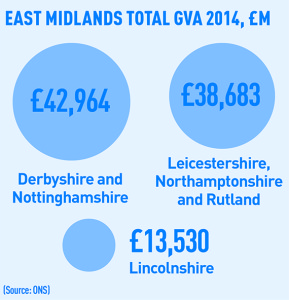 Lincolnshire. Not the first place one might think of for devolution, but it is the only area in the East Midlands to secure a deal from the government in last month’s Budget that will give it new powers and money with which to transform itself.
Lincolnshire. Not the first place one might think of for devolution, but it is the only area in the East Midlands to secure a deal from the government in last month’s Budget that will give it new powers and money with which to transform itself.
The Greater Lincolnshire deal is a coup for the area and includes the county, its districts and the unitary councils of North Lincolnshire and North East Lincolnshire, based on Scunthorpe and Grimsby respectively.
The deal comes with an additional £15m a year over 30 years for investment to boost growth, a devolved local transport budget and a new investment and assets board, which will review public land and property to find sites for housing and employment.
The Greater Lincolnshire Combined Authority will also identify the infrastructure needed to support delivery of 100,000 new homes by 2036, with the councils contributing at least £100m for related infrastructure.
Councils will develop collectively a spatial framework for managing strategic planning, “with which all local development plans will be in general conformity”, the agreement says.
 Under the deal, central government is committed to support councils to unlock sites that could each take 1,500 homes or more and support new settlements, though the devolution document does not indicate where these might be.
Under the deal, central government is committed to support councils to unlock sites that could each take 1,500 homes or more and support new settlements, though the devolution document does not indicate where these might be.
Tim Downing, senior partner at Lincoln property firm Pygott & Crone, says: “I’m pleased with devolution as it means decisions can be taken in the county without going through the central government rigmarole. We can just get on with it.”
Downing says that the industries driving demand for industrial and commercial space are food, which he says is “worth £1bn a year to Lincolnshire”; offshore wind turbine manufacture at Grimsby; and engineering, built around the presence of Siemens in Lincoln.
“There is massive demand for residential and our office in Grimsby is selling 40 homes a month. We will open in Cleethorpes soon too,” Downing says. He also points to the Lucent Group’s planned new village of 3,000 homes near Scunthorpe.
Sam Elkington, senior partner in Lincoln-based Hodgson Elkington, says: “Lincolnshire has been seen by some as a bit of a poor relation in the East Midlands, but we have food, engineering and renewable energy and the country’s largest deep-water port at Immingham. Devolution means we can pull all that together more easily.”
Matthew Smith, who heads JLL’s Nottingham office, thinks the county will, however, remain quiet. “Lincolnshire is a pretty low-volume market,” he says.
“Lincoln has some success, but it’s close to Nottingham. The rest of the small market and coastal towns are a long way from cities, so they are difficult to service. And not a lot happens in Grimsby and Scunthorpe.”
But Lincolnshire now has devolution, putting it unexpectedly ahead of its higher-profile neighbours.
Elsewhere in the East Midlands, devolution in Leicestershire is making progress, but Northamptonshire is consumed by a row among councils and several wheels have fallen off the Derbyshire and Nottinghamshire joint bid, which had been in the vanguard of devolution.
Former prime minister Harold Wilson said a week was a long time in politics, and that is how long it took for the joint devolution deal for Derbyshire and Nottinghamshire county councils, their districts and the cities of Derby and Nottingham to go from imminent agreement to the brink of collapse.
A deal was well advanced and the councils concerned had earlier assented, but there was a mass outbreak of cold feet when they were asked to sign up formally in early March. Some objected to the government’s insistence on an elected mayor, others to actual or feared costs, and others felt details were lacking.
Within a few days, Amber Valley and Erewash borough councils and South Derbyshire District Council all declined to join. Meanwhile, High Peak Borough Council decided it instead wanted associate status with the Greater Manchester Combined Authority.
South Derbyshire’s Conservative leader Bob Wheeler says: “We can’t recommend getting on a bus when we don’t know what the fare is or where it’s going.”
As though these defections were not problems enough, Bassetlaw District Council and Chesterfield Borough Council then decided their economic links meant they should instead join the Sheffield City Region’s existing devolution deal. This has left Nottinghamshire (minus Bassetlaw), Derby City Council and the districts of Derbyshire Dales, Bolsover and North East Derbyshire trying convince ministers there is something worth salvaging from the wreck.
A Nottinghamshire spokesman says: “We are going ahead. The 13 councils remaining in the bid cover a population as large as some other areas with devolution deals.”
Devolution would have given councils a means to collaborate on spatial planning and infrastructure and allowed them to control the funds needed to make things happen.
Tim Garratt, managing director of Nottingham-based Innes England, says: “Devolution is something we never had, so we may not miss it, but it is a lost opportunity because Manchester and Birmingham are getting this extra support from central government and we are not. Nottingham is a core city and ought to be seen as such, but it won’t be.”
JLL’s Smith says: “The problem is that this affects the ability of places to grow. Nottingham cannot get the employment and housing land that it needs without expanding into other areas.”
Smith believes it to be “wishful thinking” by the property industry, which wants local authorities to work together to deliver devolution so the area can access extra support from central government.
Graham Bancroft, a surveyor at Derby’s BB&J Commercial, calls the likely loss of devolution “a crying shame”. He adds: “I think it would have created some opportunities through better strategic planning for developers who have been holding off doing things, and we may now lose out on investment to other areas.”
Relations between councils are now so sulphurous that Derbyshire even threatened legal action against Chesterfield over its defection.
Chesterfield’s Labour leader, John Burrows, says: “After hearing all the issues I came to a clear conclusion that [the Sheffield] deal is in the best interests of Chesterfield.”
Northamptonshire County Council is part of the England’s Economic Heartland devolution bid with neighbours Buckinghamshire and Oxfordshire, which is largely devoted to transport infrastructure.
Other progress on devolution in Northamptonshire has stalled amid acrimony over reorganising its councils. South Northampton Council wants to break away and form a unitary council with its Oxfordshire neighbour, Cherwell.
This initiative led the other five Northamptonshire districts to call for the county council’s abolition and replacement by two or three unitaries.
The county retaliated, with Conservative leader Jim Harker calling for a single county-wide council that he says would save £80m a year.
Property firms in Derbyshire, Northamptonshire and Nottinghamshire would perhaps be wise not to factor devolution into their immediate plans.
Meanwhile in Leicestershire…
In contrast to the chaos around them, Leicestershire County Council, its districts, and Leicester City Council
are working amicably on a devolution bid due for submission to ministers in the summer.
Nick Rushton, the county’s Conservative leader, says pressure from ministers for Leicestershire to join with Derbyshire and Nottinghamshire “has gone away” and a bid will be made, despite there being “no strategic direction from government on what it thinks an acceptable bid ought to look like”.
The Leicestershire and Leicester bid will concentrate on transport and co-ordinating planning for housebuilding.
“Leicester has a very tight boundary and to accommodate its housing growth it may need some help from districts. But then places like Melton want more development to finance their bypass,” Rushton says.
He adds: “There is also strong growth in demand for distribution depots across the county.”
Adjacent Rutland County Council may later join this bid.











